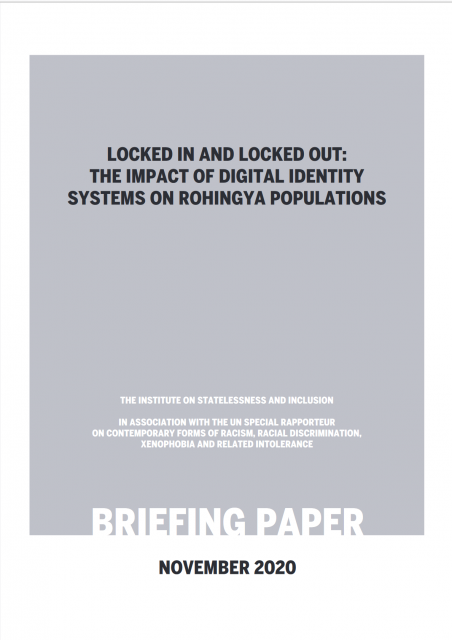Locked in and Locked out: the Impact of Digital Identity Systems on Rohingya Populations
17 November 2020


This Briefing Paper contextualises Rohingya human rights and protection concerns within the global trajectory towards legal identities for all and the increased digitisation of identification systems. The paper relates Rohingya experiences of registration systems, to wider human rights challenges around racial and xenophobic discrimination, digital technologies and bor- ders, as articulated in a recent report by the UN Special Rapporteur on Contemporary Forms of Racism, Racial Discrimination, Xenophobia and Related Intolerance.
Rohingya communities have been arbitrarily deprived of their nationality and persecuted in Myanmar, while also being denied adequate protection as refugees and stateless persons in neighbouring countries. At the centre of their insecurities and vulnerabilities, is a lack of legal status as citizens in Myanmar, and as residents, refugees and stateless persons elsewhere. For over 30 years, Rohingya in Myanmar have been subject to one of the world’s most oppressive registration and surveillance systems, the ultimate aim of which has been to exclude and persecute. In other countries, they have been left out of civil documentation procedures in order to deny them a legal status and thus avoid state responsibility. In more recent times, national personal identification systems are increasingly moving from the paper-based to digital; bringing opportunities to protect, but also potential to entrench exclusion, denial and persecution.
The root causes of the depravations and marginalisation endured by the Rohingya community over multiple decades, are based on racist, discriminatory and xenophobic ideologies, laws and policies. While Myanmar is the source of these depravations, other countries have also failed to provide meaningful protection, status or rights to Rohingya, whether they fled to their country or were born there.
In this context, a principled and sustained human rights framing of the challenges, which is rooted in the information, expertise and solutions put forward by Rohingya activists, and which challenges and shapes responses to the crisis by states, UN agencies, humanitarian actors and others, is much needed. This initiative aims to provide such a framing, through the production of briefing papers and other interventions on different human rights challenges.
Announcements
21 May 2025
Open letter: Malaysia must lead ASEAN with principle, not hypocrisy, to address the Myanmar crisis

Progressive Voice is a participatory rights-based policy research and advocacy organization rooted in civil society, that maintains strong networks and relationships with grassroots organizations and community-based organizations throughout Myanmar. It acts as a bridge to the international community and international policymakers by amplifying voices from the ground, and advocating for a rights-based policy narrative.